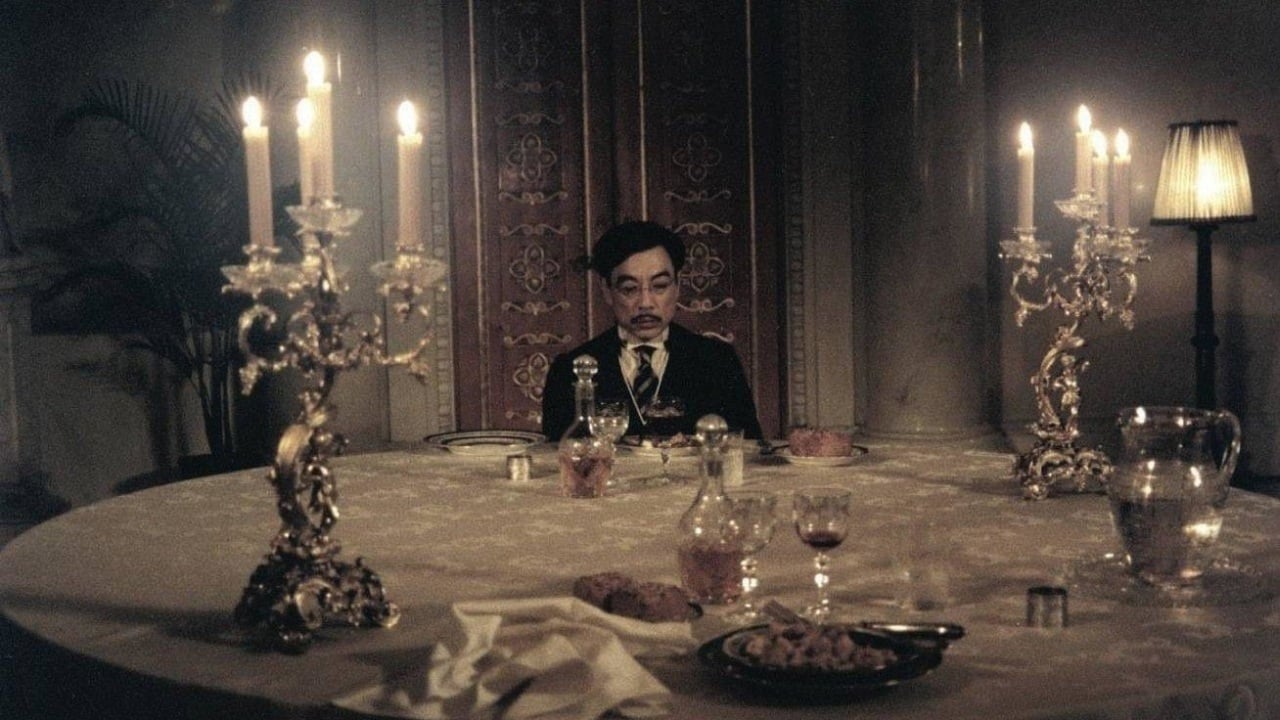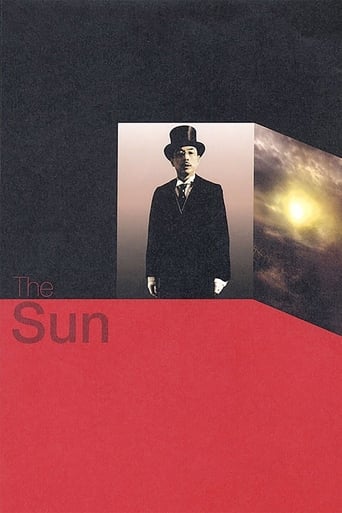

As an WWII buff, I was intrigued when I saw this film pop up on my Netflix recommence list. Alas, I ought to have taken the time to beforehand to look up the director. Alesandr Sokurov made the dreadful "Russian Ark". This film, while not nearly as bad as "Ark" or Malick's horrendous "Thin Red Line", suffers from a limp, aimless, script that is augmented by equally limp, wooden acting. The Americans in this film are a collection of stereotypes posing as characters. Richard Dawson in particular is awful. He appears to suffer from a case of macrocephaly which is seriously distracting. His massive head--quite unlike what MacArthur had-- makes him look like a mad scientist in an army uniform. His acting, the apposite of Tommy Lee Jones portrayal of MacArthur in "Emperor", is lifeless and quite unlike Douglas MacArthur.Issei does a solid enough job of portraying the Emperor. Who can pretend to accurately a man who is seen as a God and is kept largely out of the public eye? Unlike MacArthur, the actor here had little to go on in a character study.In view of this any actor who attempts to portray such a mysterious man has to be given a benefit of the doubt. That said, this is no equal to Ganz's brilliant portrayal of Hitler. Ganz put on one of the great acting performances of all time--at least the equal of Daniel Day-Lewis' Lincoln.I have one final critique and this goes for "Emperor" as well. For some reason when people make movies of the Pacific Theater they mention the A-bombs, but never the great many atrocities the Japanese committed in their 8 years of war. The Japanese were, in fact, the first country to employ WMD in WWII when they used bombs filled with bubonic plague on the Chinese. These weapons were developed by a special unit call Unit 731'. This unit committed horrors that matched those of Mengele and the Nazis. Then we have the Bataan Death March, the Rape of Nanking, and the general brutal occupations of Asian countries. The Japanese did far more than bomb Pearl Harbor. Ask the Chinese, who lost some 15 million citizens to Japanese aggression. Aggression that actually stretches back to 1931.(Even though the Sino-Japanese War did not officially begin until July of 1937.) To not mention Japanese barbarism and aggression on such a large scale is to akin to omitting the Holocaust when discussing the Nazis.
... View MoreSokurov's evocative account of Hirohito's fall from Heaven is mesmerizing in terms of narrative structure, photography and Ogata's performance. Ogata quite literally puts his life on the line by taking this role; he clearly feeds off that tension to provide a quite stunning portrayal of one of the 20th century's leading figures, one whose absence from artistic portrayal stands in juxtaposition to the pivotal role he played in leading his country through world war, nuclear destruction, to revival as an economic superpower. Think about Hitler, Mussolini, Churchill, Eisenhower, Stalin and Hirohito. Which one do you feel least able to describe? Sokurov and Ogata play on that enigmatic image. Ogata chooses to take the physical aspects of Hirohito that we know - the twitches, stiffness, child-like expressions - and amplify them to heighten the unreality of the situation, complementing Sokurov's other- worldly sepia tinted grainy photography. The film does not strive for historical accuracy. It is unlikely that Macarthur's interpreter would have been a nationalist zealot. The casting of Robert Dawson as Macarthur is the film's biggest failing - the man is more wooden than Sherwood forest. And the American photographers look like American students studying in Russia trying to earn a few rubles as extras - which is probably what they are. It is a shame that budget limitations and casting errors detract from what could have been a sublime artistic achievement. Ogata, in particular, should have been served better for the riveting performance he gives here. The Sun polemically considers what might have happened when God became man. No future attempt to portray the life of Hirohito on celluloid can avoid referring to this film. Few will emulate it. The genius here is in exploring Hirohito the man and his inadequate attempts to comprehend the momentous events that engulf him at the end of the war. By staying with him, and not pausing to bow one's head before Hiroshima, Nagasaki, or the fire-bombing of Tokyo, Sokurov provides a glimpse of a man who remains, even after his death in the late eighties, a complete enigma. The transition from deity to man happens briefly, but palpably, at the end, when Hirohtio the figurehead is shown to also be husband and father. The Sun is food for thought on a much neglected man.
... View MoreThere's an awful lot right with this film. Beautifully shot, well written, and an array of fine acting is topped off by an outstanding central performance by Issei as the Emperor whose world is slipping irretrievably out of his grasp. I really believe that, if you want a film about the last days of Imperial Divinity, you can't go far wrong with this.But is that really what you want? The story of the Emperor's changing world is not the story of the demise of Imperial Japan. The comparisons with Downfall are inevitable, but while Hitler dragged the entire world through unthinkable horrors, Hirohito merely watched others do it on his behalf. As a result, the film seems sadly removed from reality. Which, of course, is a true reflection of events - but it doesn't make for a good film.All in all, a near-flawless study of a rather boring subject. Which is a great shame.
... View MoreThe beginning of this film is exceptionally dull, half an hour of Hirohito - in an excellent, intriguing performance by Issey Sogata - pottering around, surrounded by his overbearing courtiers. His servants appear genuinely awed by the God-like emperor and can hardly bow low enough to show their total subservience. Everything - buttoning a jacket, placing a knife and fork in his hands - is undertaken for the emperor.In a curious similarity to Hitler's last days in the chaotic bunker in the recent film Downfall (2005), Hirohito is confined to his own bunker beneath his imperial palace in Tokyo. Yet, there is little sign of the war down here, just a series of dull, ill-lit yet nicely-furnished rooms, all wooden panelling and seemingly very quiet, in the aftermath of the atomic bombs. The strange thing is the almost entirely Westernised clothes and total banality of the emperor's life. Hirohito wanders around like an Edwardian gentleman, attired in exquisite tailoring, all top hat and fine suits, like Bertie Wooster without the humour.Hirohito studies Darwin and makes a few minor reflections on his role in Japanese imperialism leading up to the war, and the nature of the beast, yet he is basically Chauncey Gardiner (Peter Selles) in the film Being There (1979), a sort of idiot-savant set free into a world of which he has little or no understanding. You just can't believe that Hirohito had any serious role in the whole affair.Continuing the Darwinist motif, there are little surrealist sequences, dream-like glimpses into Hirohito's mind, with strange flying fish bombers and so forth. In these sections, the film's like a sort of Salvador Dali/Luis Buenuel/Hirohito war and bombing comb. This reminds me of the brilliant Terence Mallick film, The Thin Red Line (1998), with several US troops under-going similar experiences in an island paradise during the terrible war in the Pacific.This is why I think the film works. The first meeting of Hirohito and MacArthur - in effect, the new emperor of Japan - is full of tension, a clash of two cultures, both incredibly nervous of each other. The two men start bonding and in one incredible moment of film, MacArthur and Hirohito have a sort of cigar kiss, the former lighting the emperor's cigar while puffing on his own, both engaged, head-to-head. It's like they're exchanging the fumes of victory and defeat. The embers. It is like an antidote to Bill Clinton's normal use of cigars.They get along just fine, like Laurel and Hardy Go to Tokyo, or something. Or Will Hay, for British readers.Did Hirohito really speak English? In one moment, Hirohito - in true Chauncey Gardiner fashion - goes into the garden for his first-ever photo-shoot. The photographers are squabbling amongst themselves over terms and conditions while, in the background, this peculiar, be-suited gentleman wanders around tending his roses. He proves to be quite a star, however, influences as he is by the American film stars he so idolises.
... View More